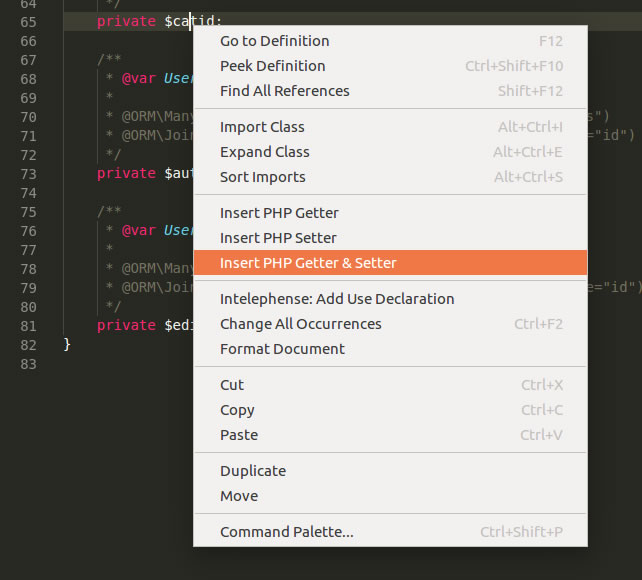Fast generator of getters and setters for your PHP class properties.
This extension allows you to quickly generate getters and setters with one single command.
Features:
- Detects indentation. No matter if you use spaces or tabs.
- Uses configuration options to show doc blocks as you like them.
- Generates method's descriptions based on the property description.
- Detects valid type hints to use them in the setter.
It adds 3 comands to vscode's command palette:
- Insert PHP getter.
- Insert PHP setter.
- Insert PHP getter and setter.
You can also access commands from contextual menu when clicking on a class property:
This extension contributes the following settings:
phpGettersSetters.spacesAfterParam: Number of spaces to insert between @param tag and variable name in doc blocks. Default: 2phpGettersSetters.spacesAfterParamVar: Number of spaces to insert after the variable name in the @param tag line. Default: 2phpGettersSetters.spacesAfterReturn: Number of spaces to insert after the @return tag. Default: 2phpGettersSetters.redirect: Redirect editor to generated functions after generating them? Default: truephpGettersSetters.templatesDir: Folder where custom templates are storedphpGettersSetters.getterTemplate: File to use as template for getters. Default: getter.jsphpGettersSetters.setterTemplate: File to use as template for setters. Default :setter.js
By default this extension will use a custom function to generate your getters & setters but you can fully customise the markup used to generate them. By default templates are stored in:
- Linux:
~/.config/Code/User/phpGettersSetters - OSX:
~/Library/Application Support/Code/User/phpGettersSetters - Windows:
Users\{User}\AppData\Roaming\Code\User\phpGettersSetters
You can also set a custom templates dir entering a custom folder in phpGettersSetters.templatesDir setting.
Template Literals are used for templating because the flexibility they provide. With them you can easily create a custom template with no knowledge and also invest some time for complex things. For advanced usage you will have to google about template literals but here are 2 sample templates.
Sample getter.js template:
module.exports = (property) => `
/**
* ${property.getterDescription()}
*
* @return ${property.getType() ? property.getType() : 'mixed'}
*/
public function ${property.getterName()}()
{
return $this->${property.getName()};
}
`
Sample setter.js template:
module.exports = (property) => `
/**
* ${property.setterDescription()}
*
* @param ${property.getType() ? property.getType() : 'mixed'} \$${property.getName()} ${property.getDescription() ? property.getDescription() : ''}
*
* @return self
*/
public function ${property.setterName()}(${property.getTypeHint() ? property.getTypeHint() + ' ' : '' }\$${property.getName()})
{
$this->${property.getName()} = \$${property.getName()};
return $this;
}
`
As you can see a Property object is passed to templates so you can access any public method there. I also like the idea of adding more stuff as users find limits. Open an issue if you find something you cannot achieve.
Relevant releases:
- Added support for custom templates
- Added support for multiple cursor
- Fixed
No property foundwhen switching between editors. Thanks for reporting Carlos Alfonso Pérez Rivera!
- Added context menu links
- Initial version

